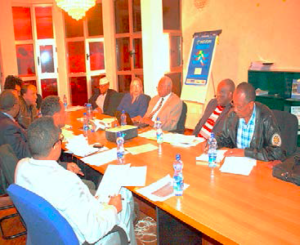
Lessons learned from previous USAID assistance to improve livelihoods and increase resiliency in pastoral areas demonstrate that in order to achieve sustainable outcomes, projects need to work closely with and secure government recognition and legitimization of participatory, grassroots activities to map community boundaries and manage natural resources. This is especially true for LAND as it seeks, for the first time in Ethiopia, to formalize participatory mapping activities by supporting adjudication, demarcation, and government certification of community and rangeland boundaries.
LAND successfully negotiated with the Oromia Bureau of Rural Land and Environmental Protection (OBRLEP) to establish the Oromia Pastoralist Advisory Committee (OPAC) on Land Administration & Natural Resources Management on February 13, 2104. OPAC will provide a joint government and community stakeholder forum for ensuring all project stakeholders are clearly informed about project activities, procedures, outcomes, and benefits as well as their respective roles and responsibilities.
Effective information sharing and coordination of activities between government officials and community representatives and the LAND and USAID Pastoralists Resiliency Improvement and Market Expansion (PRIME) project will help ensure stakeholder buy-in and support for project activities as well as assist USAID to maximize development impacts. Most importantly, the forum will promote sustainable project outcomes by helping to ensure regional government legitimizes and certifies boundaries demarcated and natural resource management plans and agreements produced with LAND assistance. Lessons learned through collaboration with regional officials will be shared with the Land Administration and Use Directorate of the Ministry of Agriculture (LAUD/MOA) so LAND achievements can be replicated in other regions, further promoting project sustainability. Oromia officials wholly supported LAND’s initiative and requested LAND establish Zonal-level OPACs to include zonal officials and customary leadership of rangeland management units (dhedas) to ensure LAND activities at the grass roots level are fully coordinated with the government.
In addition to OBRLEP and LAUD/MOA, OPAC stakeholders include the Oromia Pastoralists Association, Oromia Pastoral Development Commission, USAID, and the LAND and PRIME projects. LAND will serve as the OPAC secretariat.

